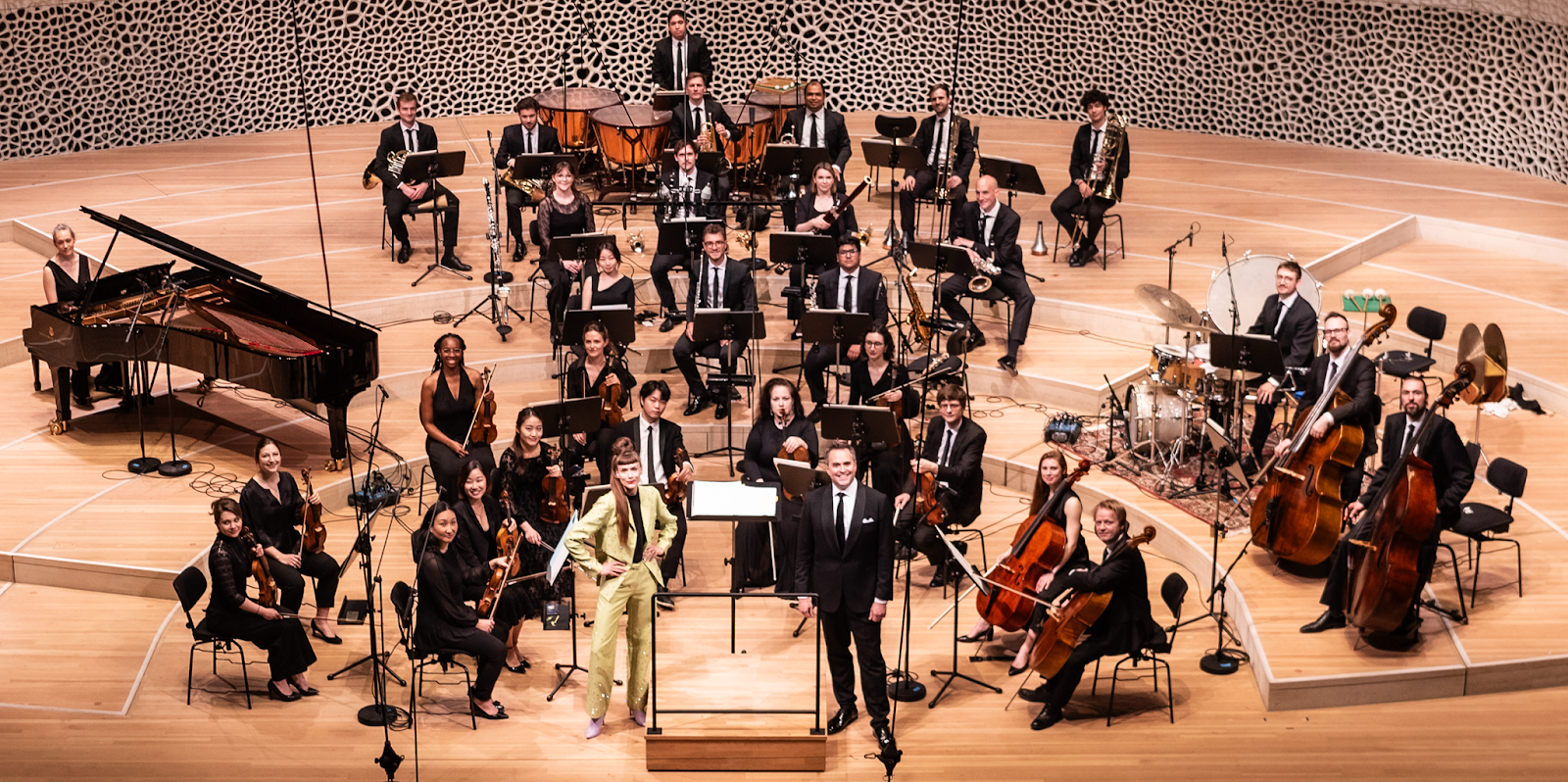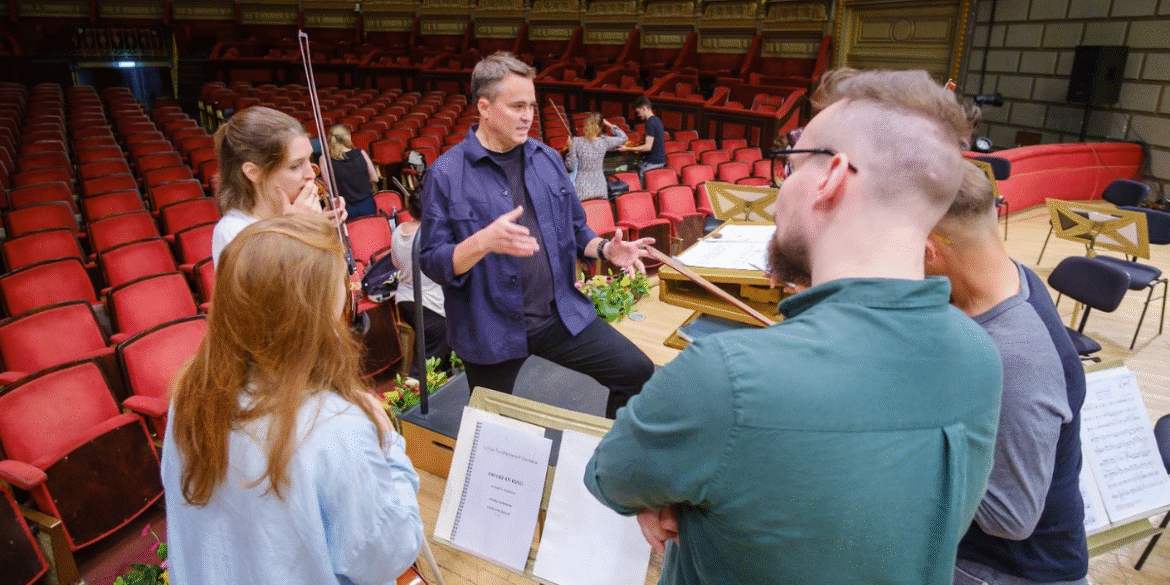The Berlin Academy of American Music at Romania’s famed George Enescu Festival. Photo: 3435 Studio
What happens when an American conductor settles in Berlin and starts imagining a different kind of orchestra—one that reflects both where he comes from and where classical music could go? That’s the story behind the Berlin Academy of American Music (BAAM), a dynamic ensemble founded by conductor Garrett Keast during one of the most uncertain moments in recent history.
The idea of BAAM was born in 2020, as Keast’s international conducting engagements were suddenly cancelled due to the COVID-19 pandemic. The first cancellation came while he was conducting at the Royal Swedish Opera in Stockholm. Back home in Berlin with his wife and two young sons—and an unexpected abundance of time—Keast found himself rethinking his artistic path. After years of championing American repertoire abroad, he began to shape a new vision. One conversation led to another, and what started as a period of soul-searching quickly transformed into the first iterations of BAAM.
Based in Berlin, one of Europe’s most creatively vibrant cities, BAAM was founded with a clear mission: to bring American classical music to European audiences in a fresh and forward-looking way. Under Keast’s artistic leadership, the orchestra focuses on music that combines drive, transparency, and bold invention—qualities deeply rooted in the American sound.
BAAM’s programming is both respectful of tradition and boldly contemporary. The ensemble performs works by iconic American composers such as Leonard Bernstein, George Gershwin, and Aaron Copland, alongside those of living composers like Missy Mazzoli, David T. Little, Ursula Mamlok, Caroline Shaw, and Billy Childs. The result is a musical offering that bridges generations, genres, and geographies—capturing the vitality and complexity of American music while engaging European audiences in a cultural conversation that feels both timely and timeless.
BAAM’s debut album, Transatlantic, earned 5-star reviews from BBC Music Magazine, Limelight, Fanfare, and Das Orchester, thanks to its bold blend of American classics and contemporary voices. The ensemble has since performed to sold-out halls at major venues such as Hamburg’s Elbphilharmonie and Berlin’s Konzerthaus, and appeared at international festivals including the George Enescu Festival in Romania and the Kronberg Festival in Germany.
In addition to its performance schedule, BAAM is investing in the future of musical exchange. The newly launched Berlin Transatlantic Composers Workshop invites emerging composers from both sides of the Atlantic to collaborate in Berlin each summer. Keast is also leading the development of the Berlin Transatlantic Music Festival, a multi-genre, weeklong celebration that will spotlight the shared musical DNA of Europe and North America—from concert halls to jazz clubs and beyond.
 The Berlin Academy of American Music in Hamburg’s Elbphilharmonie with composer Josefine Opsahl and Garrett Keast. Photo: Kiran West
The Berlin Academy of American Music in Hamburg’s Elbphilharmonie with composer Josefine Opsahl and Garrett Keast. Photo: Kiran West
BAAM’s members come from across the globe, and that diversity brings a unique openness to the orchestra’s sound. Keast, known for his expressive and collaborative conducting style, emphasizes the importance of connection—not just between musicians on stage, but between performers and audiences. His approach to programming and performance is deeply human, shaped by a belief in music’s ability to build bridges across cultures.
As Opernnetz once noted, “He goes beyond music; he strives to create an atmosphere and evoke feelings in the listener.” That spirit runs through every BAAM performance.
“BAAM isn’t just an orchestra,” Keast says. “It’s a collaboration. The music we play reflects the diverse, ever-evolving world of American music—but more than that, it’s about creating a space where music speaks to people, no matter where they’re from.”
In a time marked by global divisions, BAAM stands as a hopeful counterpoint. Its mission is about more than music: it’s about cultural connection, artistic risk-taking, and the belief that the concert hall can still be a place where people come together and feel something deeply.
As BAAM grows, so does Keast’s commitment to fostering new talent, encouraging transatlantic collaboration, and offering a fresh perspective on classical music in Europe. The Berlin Academy of American Music isn’t just an ensemble. It’s a living, breathing bridge between two continents and a celebration of what can happen when artists take bold ideas seriously.
For more information, visit baamorch.de or follow the orchestra on Instagram.
To learn more about Garrett Keast and his musical journey, visit garrettkeast.com.

